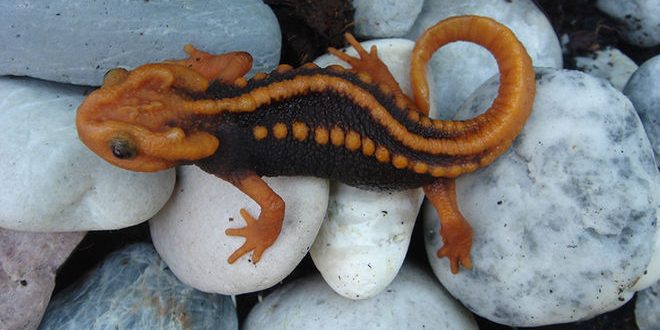The Klingon newt, found in northeastern Thailand, has a burgundy body and black markings that make it easy to spot amid the greenery of the surrounding area.
Tylototriton anguliceps’ distinctive skull shape is reminiscent of that of Lieutenant Worf and other Klingons on Star Trek.
A new report published by World Wildlife Fund unveiled 163 new Mekong species to the world.
Of these species, three mammals, nine amphibians, 11 fish, 14 reptiles, and 126 plants were identified for the first time. The Klingon newt is in the company of other dazzling animals like the “Ziggy Stardust” snake and the wooly-headed bat.
It was discovered by a team lead by Thai biologist Porrawee Pomchote and is only the fourth species of newt to be found in Thailand. With a dorsal ridge and red splattered markings, this newt is typically between six and seven centimeters long.
The Greater Mekong region is famous for being a site to find newly discovered species. According to the World Wildlife Fund, between 1997 and 2015 there have been 2,409 new species discovered in the region. That there are so many species left to be discovered shouldn’t come as a surprise — some scientists surmise that 99.9 percent of species are currently unnamed and undiscovered.
But although it’s a hotbed of biological diversity, the Greater Mekong region is also threatened by overdevelopment, poaching, and pollution. The Klingon newt is particularly at risk because of the effects of deforestation and pesticide use in the area. As amphibians, they have porous skin, which makes it easy for them to absorb pesticide.
“It is rather lucky that all newt populations in Thailand are distributed in many protected areas like national parks or wildlife sanctuaries,” an optimistic Pomchote said in a statement to the WWF. “But I strongly support raising awareness of the incredible biodiversity of the region and the need to protect it.”
Agencies/Canadajournal

 Canada Journal – News of the World Articles and videos to bring you the biggest Canadian news stories from across the country every day
Canada Journal – News of the World Articles and videos to bring you the biggest Canadian news stories from across the country every day

